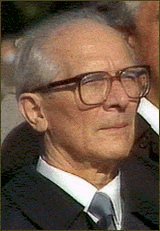Erich Honecker (25 August 1912–29 May 1994) was a German Communist politician who led East Germany from 1971 until 1989. After German re-unification, he was imprisoned and tried for high treason by Germany, but was released due to ill health and died of cancer shortly after being exiled to Chile.
Early political career
Honecker was born in Neunkirchen, in Saarland, as the son of a politically militant coal miner. He joined the youth section (Jugendverband) of the Communist Party of Germany (Kommunistische Partei Deutschlands, KPD) in 1926 and joined the KPD itself in 1929. That year he was sent to Moscow to study at the International Lenin School . He returned to Germany in 1931 and was arrested in 1935 after the Nazis had come to power (Machtübernahme). In 1937 he was sentenced to ten years for Communist activities and remained in captivity until the end of World War II.
At the end of the war, Honecker resumed activity in the party under leader Walter Ulbricht. In 1946, Honecker was one of the first members of the Socialist Unity Party of Germany (Sozialistische Einheitspartei Deutschlands, SED), made up of the old KPD and the Social Democrats of eastern Germany. Following a sweeping victory in the October 1946 elections, he took his place amongst the SED leadership in the short-lived parliament. East Germany was proclaimed on October 7, 1949 with the adoption of a new constitution. In a political system similar to that of the Soviet Union, he was a candidate member for the secretariat of the Central Committee in 1950 and full member in 1958.
Leadership of East Germany
In 1961 Honecker was in charge of the building of the Berlin Wall. In 1971, he initiated a political power struggle that led, with Soviet support, to himself becoming the new leader, replacing Walter Ulbricht as General Secretary of the Socialist Unity Party. In 1976 he also became Chairman of the Council of State (Staatsratsvorsitzender). During the 1980s, when Soviet leader Mikhail Gorbachev began his reforms, Honecker remained a hard-line Communist. However, as reform spread throughout the Eastern bloc, popular protest led to Honecker's resignation on October 18, 1989, and he was replaced by his short-lived successor Egon Krenz.
Depictions of Erich Honecker
As in many communist countries, the image of the leader was everpresent in public offices (where portraits such as the one above were hung), in newspapers and on television news. The record for most number of photographs of Erich Honecker in the official SED newspaper, Neues Deutschland , was 41, in the edition of 16 March 1987, on the occasion of Honecker's opening of the Leipzig Messe , as he was shown with different politicians and exhibitors.
Post-1989

Erich Honecker
From 1989 until 1993, Honecker avoided prosecution over alleged Cold War crimes, specifically the 192 deaths of those trying to escape over the Berlin Wall. He initially remained in a Soviet military hospital near Berlin before leaving for Moscow. Following the collapse of the Soviet Union he was returned to Germany in 1992. But when he did come to trial in 1993 he was released due to ill-health and moved to Chile where he died of liver cancer in Santiago in May 1994.
Famous quotes
- "The Wall will remain so long as the conditions that led to its erection are not changed. It will be standing even in 50 and even in 100 years, if the necessary conditions are not removed." (Berlin, 19 January 1989)
External links